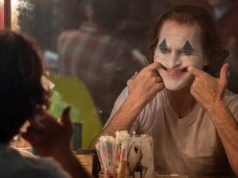A mischievous visual style and oodles of charm from the principal cast make “Cherish” a very good (but not great) movie that will especially inspire enthusiasm among people in their late ’20s.
Zoe Adler (Robin Tunney) is a lonely single girl in San Francisco who is terrified of being by herself. She parties nearly every night to avoid being home alone, and she dates many, many guys. (“I wouldn’t date so many guys if ONE guy would ever call me back,” she says.)
She also whiles away the hours by listening to a DJ called Cupid on a local radio station. She adores the cheesy love ballads of the ’70s and ’80s, and she complains about how fickle we are: We love a song, which leads to it being played a lot on the radio … and then we decide we hate it.
Just as she has found her music-loving soulmate — a co-worker played by Jason Priestley, of all people — she is the victim of a carjacking gone awry, leading to the mowing down of a police officer and a manslaughter charge against her. (The bad guy got away, and no one believes her that anyone else was even in the car with her.) She is given the worst possible punishment for someone as social as she is: house arrest. An electronic bracelet on her ankle monitors her whereabouts, and she’s not allowed to leave her apartment.
Left to her own resources, she strikes up a friendship with the crippled gay midget downstairs (Brad Hunt), and a love-hate relationship with Daly (Tim Blake Nelson), the anal-retentive county employee who stops by occasionally to make sure the bracelet is working properly.
This pop-cultural romantic comedy becomes part-thriller when the carjacker — aware he killed a cop and caused a lot of trouble for Zoe — starts stalking her. But since no one believes the guy even exists, it’s up to Zoe to save the day herself.
Director Finn Taylor (who also scripted) has more fun with the confines of Zoe’s apartment than your average director would; he is aided in this by Barry Stone’s whimsical cinematography. Songs like “Tainted Love,” “Don’t You Want Me, Baby” and others also add to the general merriment.
The dialogue is occasionally awkward and unrealistic, and there are some events that simply don’t make sense. Zoe’s final actions of the film are foremost on that list; in fact, the entire “thriller” part of the film isn’t nearly as successful as the comedy part. And while Robin Tunney is a charming, modern version of Audrey Hepburn, her character is ill-defined. She’s made out to be a nerdy loser among her co-workers, yet she’s also quite pretty and has a lot of dates. Wouldn’t someone who goes out as much as she does be far less socially awkward?
Anyway, these are quibbles that are worth mentioning, because they detract from the film’s overall quality. But they’re not deal-breakers. “Cherish,” while flawed, is still an entertaining bit of fluff.
B (; )





